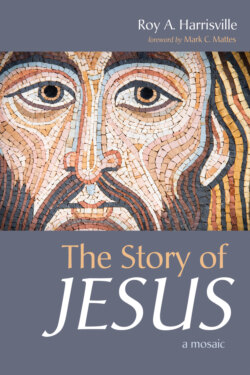Читать книгу The Story of Jesus - Roy A. Harrisville - Страница 10
На сайте Литреса книга снята с продажи.
The Prologue in John
ОглавлениеAs in Mark, the birth narratives are omitted by the Fourth Evangelist, with the exception of his reference to the Baptist, and replaced with a “Prologue,” intended to describe the event of Christ from the time before time. “In the beginning was the Word, and the Word was with God, and the Word was God” (John 1:1) Any attempt to render that line ‘and the Word was divine” comes a cropper on the rule that the anarthrous noun, that is, the noun absent its article, when followed by the copula, that is, the verb “to be,” is to be taken qualitatively, thus “was God.” That beginning was not the beginning of the creation (Genesis 1:1 “In the beginning when Goad created the heavens and the earth”), but prior to the creaction, an event come about by that Word.: “All things came to being through him, and without him not one ting came into being” (John 1:3). The view is staggering, that the babe of Bethlehem in Matthew’s or Luke’s account had a life, an existence before its birth, a life with God, and not merely with, but as God. “”In him was life,” John continues, “and the life was the light was the light of all people” (John 1:4) Whatever existed or “came to light,” could be seen, heard, tasted, smelled or touched, did so by virtue of this Word. And if there should be (as there actually was) a dispute regarding the identity of this Word, he was not a witness to the light but that very light itself: “There was a man sent from God, whose name was John. . ..He himself was not the light, but he came to testify to the light” (John 1:6, 8).
This one in whom was life and light, this Word who was with God, in fact was God, took on human existence: “And the Word became flesh and lived among us, and we have seen his glory” (John 1:14). In a terse sentence or two the evangelist records the reaction to this Word having entered the world: “The world did not know him. He came to what as his own, and his own people did not accept him.” John 1:10, 11). And those who did receive him did not do so by summoning up a response from within : (“They) were born, not of blood or of the will of the flesh or of the will of man, but of God”) John 1:13).
To this taking on of flesh, this Incarnation, the author is witness: “We have seen his glory as of a father’s only son” (John 1:14), a “grace” and a “truth” to put the greatest figure of aviation history till then in the shade—Moses and his law—a Revealer to make known what had all the time been hidden with the hidden God: “No one has ever seen God. It is God the only Son, who is close to the Father’s heart, who has made him known” (John 1:18).
If these verses are a Prologue, they are also a synopsis. They sum up, encapsulate, the life and career of Christ, how it all began, and how it ended. And perhaps to the point of controlling or harnessing the entire Gospel narrative, the signs and the discourses, the passion and its sequel in the resurrection appearances. This Prologue would raise alarm in almost every quarter of the early Church, but its author has harsh words for whomever suggests the event merely seemed to be as he describes it, that God and “flesh,” God and matter cannot mix. (I John 4:2–3: “Every spirit that confesses that Jesus Christ has come in the flesh, is from God, and every spirit that does not confess Jesus is not from God. And this is the spirit of the antichrist.”)
